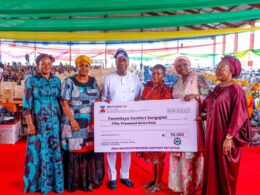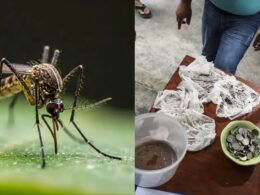The African Development Bank (AfDB) has earmarked $134 million to support the cultivation of essential crops such as rice, maize, cassava, and soybeans.
The announcement was made by Dr. Akinwunmi Adesina, President of the AfDB, following his visit to the Centre for Dryland Agriculture (CDA) at Bayero University, Kano.
Adesina disclosed that the allocated funds would be utilized to cultivate 300,000 hectares of rice and maize, alongside 150,000 hectares of cassava and 50,000 hectares of soybeans for the upcoming planting season in 2024. Additionally, the AfDB plans to support the cultivation of 118,000 hectares of heat-tolerant wheat varieties and an additional 150,000 hectares of maize.
“We live in an era of climate change, and yet only three per cent of African agriculture is under irrigation. We have to make sure we help our farmers with information that is timely and appropriate,” stated Adesina. “We have no alternative but to adapt to climate change and adopt better ways of using water, particularly in the cultivation of dry land crops that are more resilient and tolerant.”
Furthermore, the AfDB will provide grants to the CDA and collaborate with it to establish a center focused on weather pattern predictions and information collection. This initiative aims to empower farmers with accurate data to enhance their planting practices effectively.
“We will work with the center to become one of the centers of excellence in technology. We will also support youths to develop their business ideas into reality with our $20,000 grant on Agri Pitch’ and Agri Hacking’,” Adesina added.
Nigeria currently faces a significant challenge with food inflation, which stands at 35.41%, according to the Nigeria Bureau of Statistics. This has resulted in a quadruple increase in the prices of food items, leading to a nationwide food crisis and protests by organized labor over persistent hunger in the country.
In response to this crisis, the United Nations World Food Programme (WFP) welcomed a generous donation of 25,000 tons of wheat from the Government of Ukraine. This donation will help provide emergency food assistance to 1.3 million crisis-affected people in Nigeria.
The shipment of wheat was made possible through collaborative efforts from various countries, including the United Kingdom, Canada, Denmark, Finland, France, Luxembourg, Norway, the Republic of Korea, and Sweden. These countries contributed to covering the costs of transporting the wheat from Ukraine to Nigeria and its distribution to families in need.
Deadly conflicts in Nigeria have displaced millions of households from their homes and farmlands, negatively impacting food production and supply. The assistance provided by the WFP and the collaborative efforts of multiple nations aim to alleviate the suffering of those affected by the food crisis in Nigeria.










Join our Channel...